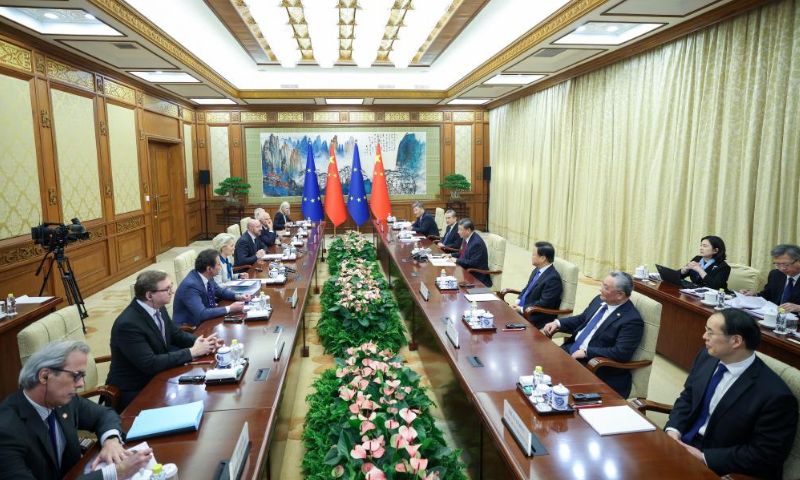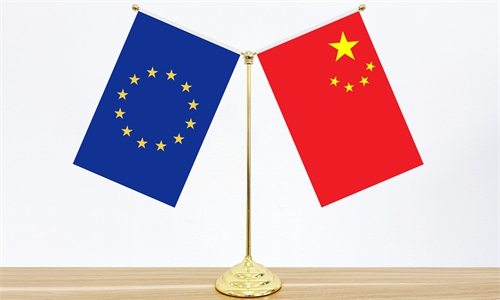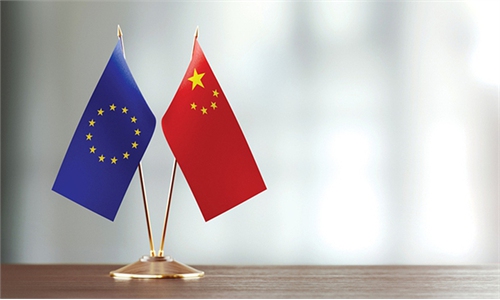Positive aspects of China-EU ties often intentionally underestimated: Global Times editorial

Chinese President Xi Jinping meets with President of the European Council Charles Michel and President of the European Commission Ursula von der Leyen, who are in China for the 24th China-EU Summit, at the Diaoyutai State Guesthouse in Beijing, capital of China, December 7, 2023. Photo: Xinhua
Chinese President Xi Jinping met with President of the European Council Charles Michel and President of the European Commission Ursula von der Leyen, who are in China for the 24th China-EU Summit, at the Diaoyutai State Guesthouse in Beijing on Thursday.
According to an official report of the meeting, both sides reached consensus on some fundamental issues. The candid and friendly atmosphere of the meeting and the constructive outcomes stand in contrast to the tone of recent reports and comments from the US and Western media.
The actual state of China-EU relations is better than that portrayed by Western public opinion, which is a common phenomenon. It shows that the negative aspects of China-EU relations or the disagreements between the two sides have been amplified by the media, while the positive aspects and consensus have been ignored or underestimated. The reasons for this situation include misunderstandings and ignorance, but it cannot be ruled out that some individuals deliberately portray China-EU relations as very negative. They may simply do not want to see good relations between China and the EU, and therefore deliberately exaggerate the disagreements on many issues between the two sides.
During the meeting with Michel and von der Leyen, President Xi emphasized the need for both sides to develop a right perception of each other, promote mutual understanding and trust, honor commitments, do the right thing and be wholehearted in developing China-EU relations. He also said, "We should not view each other as rivals just because our systems are different, reduce cooperation because competition exists, or engage in confrontation because there are disagreements."
This is the most fundamental issue in the mutual understanding between China and the EU, and it is highly urgent in the current situation. As long as China and the EU anchor their direction to this lighthouse, they will not deviate from their course.
Michel and Von der Leyen also gave positive comments on the meeting respectively on their social media accounts, recognizing the stability and development of China-EU relations, which are crucial for the peace, stability, and prosperity of not only China and the EU but also the world. This has also been consistently emphasized by the Chinese side. On the same day, Chinese Premier Li Qiang, together with Michel and Von der Leyen, co-chaired the China-EU Summit and reached a series of consensus. This once again illustrates that the common interests between China and the EU far outweigh the divergences, and both sides can further strengthen the bond of their shared interests through constructive efforts.
Whenever European leaders visit China or participate in high-level China-EU communication, some European public opinions and political elites tend to compile a list of issues to pressure China. Frankly, this approach is quite off-putting to the Chinese people. Europeans should focus on managing their own affairs well; they neither have the authority nor the qualifications to meddle in China's matters. This time, Michel and Von der Leyen received a list that included topics such as the Taiwan question, human rights issue, and even the South China Sea issue.
However, these issues were not highlighted in the EU side's official briefings before the meeting nor on the social media accounts of Michel and Von der Leyen. They were not mentioned at all. It was only in the post-meeting press releases that these issues were briefly mentioned at the end, which seemed more like a routine disclosure to address European public opinion. We have taken note of this detail and interpret it as the European side recognizing the genuine sentiments of the Chinese people and demonstrating a sense of propriety.
Michel and Von der Leyen have emphasized the issue of trade balance between China and the EU on many occasions, indicating that this is a focal point of their visit. While there are differences between China and the EU on this matter, it appears more concrete and pragmatic compared to unrelated issues such as the Taiwan question and South China Sea issue, which are irrelevant to Europe, as well as other broadly politicized and securitized concerns. Actually, it is indeed necessary for both sides to strengthen communication on the trade balance issue and seek mutually beneficial solutions.
The EU-China trade deficit is nearly 400 billion euros, which is high. However, to truly address this issue, one must trace its origin. Over one-third of the exports of European enterprises operating in China are ultimately sold back in Europe. While China appears to have a trade surplus on the surface, a significant portion of the profits is enjoyed by the European side. On the other hand, Europe is implementing more and more restrictions on the export of high-tech products to China under the guise of "derisking." This inevitably affects exports to China and exacerbates the imbalance in China-EU trade.
We hope that the European side can consider the issues more comprehensively and objectively, proceeding in a pragmatic spirit and meeting China halfway. We also warmly welcome European businesses to participate in the China International Import Expo and the China International Supply Chain Expo, facilitating better access to the vast market of over 1.4 billion people in China. China has never deliberately pursued a trade surplus and has consistently made efforts to promote trade balance. As long as economic and trade issues are not politicized or securitized, they are essentially technical matters that can be resolved through effective communication and coordination between both sides.
During the meeting on Thursday, President Xi said that China sees the EU as "a key partner for economic and trade cooperation, a preferred partner for scientific and technological cooperation, and a trustworthy partner for industrial and supply chain cooperation." These three "partner" designations not only reflect China's policy toward the EU but also fully embody the overall attitude of Chinese society toward Europe. On Thursday, the European side repeatedly emphasized the great importance it attached to its relationship with China, and the hope to build "long-term, stable, predictable and sustainable development with China." We also look forward to seeing these attitudes translated into concrete actions by the European side. This holds extraordinary significance for China, Europe and the world.


